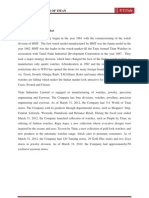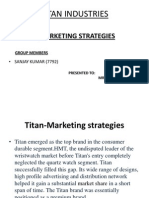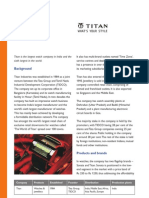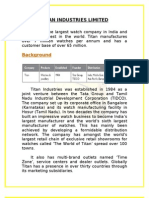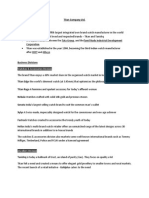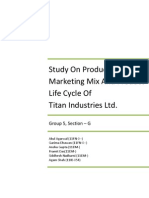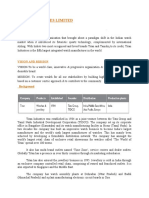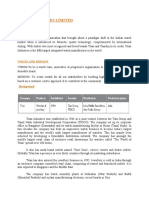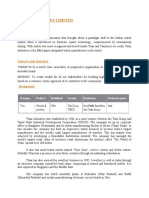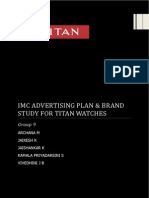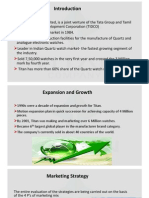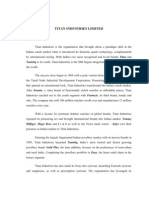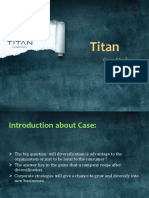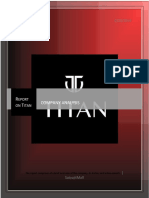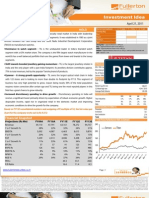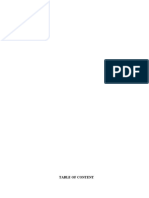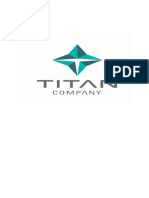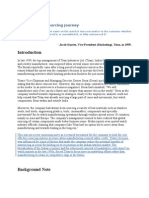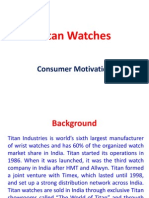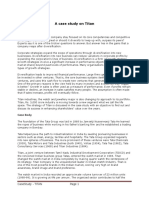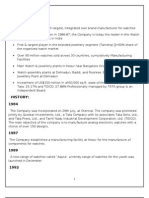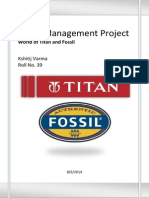Titan Industries Limited
Titan Industries Limited
Uploaded by
rajeshreepstel777Copyright:
Available Formats
Titan Industries Limited
Titan Industries Limited
Uploaded by
rajeshreepstel777Original Description:
Copyright
Available Formats
Share this document
Did you find this document useful?
Is this content inappropriate?
Copyright:
Available Formats
Titan Industries Limited
Titan Industries Limited
Uploaded by
rajeshreepstel777Copyright:
Available Formats
TITAN INDUSTRIES LIMITED
Titan is the largest watch company in India and the sixth largest in the world.
Background
Titan Industries was established in 1984 as a joint venture between the Tata Group and Tamil Nadu Industrial Development Corporation (TIDCO). The company set up its corporate office in Bangalore (Karnataka) and its watch manufacturing facility in Hosur (Tamil Nadu). In two decades the company has built an impressive watch business to become Indias largest manufacturer and the world's sixth largest manufacturer of watches. This has mainly been achieved by developing a formidable distribution network.The company has amongst the world's largest retail chain of exclusive retail showrooms for watches called The World of Titan spread over 100 towns.
It also has multi-brand outlets named Time Zone, service centres and dealer outlets. Globally Titan has a presence in over thirty countries through its marketing subsidiaries. Titan has also entered the jewellery business in 1995. Jewellery is sold in India through an exclusive company controlled retail chain, comprising of owned and franchised outlets. It is also exported to Singapore and the Middle East. The company has watch assembly plants at Dehradun (Uttar Pradesh) and Baddi (Himachal Pradesh) and a plant manufacturing electronic circuit boards in Goa. The majority stake in the company is held by the promoters, with TIDCO having 28 per cent of the shares and Tata Group companies owning 25 per cent of the shares. Public holding in the company is around 28 per cent.The rest of the stake is held by foreign institutions, non-resident Indians, mutual funds and other institutions.
Products and brands
In watches, the company has two flagship brands Sonata and Titan. Sonata is positioned in the lowend segment in the market with a price band of Rs 250 to Rs 1250, thus addressing the affordability
Company Titan Products Watches & jewellery Established 1984 Founder Tata Group, TIDCO Distribution India, Middle East, Africa, Asia Pacific, Europe Production plants India
169
Subsidiary/ associate company Titan Time Products Limited (TTPL)
Role Set up initially as a joint venture between Titan and Economic Development Corporation of Goa, Daman & Diu (EDC) to manufacture Electronic Circuit Boards; later became a wholly-owned subsidiary, following disinvestment by EDC in favour of Titan Oversees global operations Associate company that markets the Titan as well as Tanishq brands in Middle East and Africa Associate company that carries out marketing of Titan brand in Europe Deemed subsidiary that carries out marketing in Asia Pacific region Marketing activities
Titan International Holdings BV, Amsterdam (TIHBV) Titan International Middle East (TIME)
Titan International Marketing Limited (TIML), UK
Titan Watches & Jewellery International (Asia-Pacific) Pte Ltd., Singapore (TAPL) Titan Brand Holdings NV (TBHNV)
issue of Indian consumers.The brand Titan is positioned in the middle and upper segment and has a range of sub-brands like Edge, Fastrack, Nebula, Raga, Steel, Regalia, Bandhan and Flip.The jewellery business selling under the brand name Tanishq has a share of slightly over 50 per cent in the total revenues of the company while watches have about 45%.The balance is accounted for by the new businesses viz. Precision Engineering, Accessories & Licensed Products. In jewellery, gemstudded jewellery, which has higher margins as compared to plain gold jewellery, has seen its share rise steadily to 30 per cent. The company is involved in retailing of accessories like sunglasses (brand Fastrack) and manufacturing
of precision engineering products, mainly in automotive and aerospace.Watches under the license of designer wear brand Tommy Hilfiger have also been launched. In the international markets Titan has also introduced a perfume under the brand name Evolve.
Financial analysis
Sales of the company witnessed a 14.7 per cent CAGR between 1999 and 2005. Most of this growth has come from the jewellery business, which has grown at a CAGR of 38 per cent. During this period net profit of the company has grown at a CAGR of 25 per cent.The companys operating margins have declined as the product mix of the company is shifting towards jewellery segment that historically has lower profit margins. The return on capital employed has seen a significant increase driven mainly by the enhancement in operational efficiency, including a reduction in capital employed in the jewellery division, despite the rapid top line growth. Reducing funds were employed in working capital of the domestic business through new initiatives like
170
This was a result of an arrangement with France Ebauches from whom Titan had sourced its movement technology to buy back a part of Titans production of watch movements.This led the company to get keen on selling the value-added watch in the international markets instead of selling the movements.The company first launched its watch range in the Middle East in 1991.The Middle East emerged as the best choice as it had a sizeable non-resident Indian population that was familiar with the brand.With the availability of Indian newspapers and television channels, the spill over of domestic advertising was another influential factor. The first global footprint was placed in the United Arab Emirates the largest market in the Middle East.This was followed by an entry into Kuwait, Oman, Saudi Arabia, Egypt and a few key markets in Africa. Despite competition from global majors, Titan achieved sales of over 100,000 watches within a year of its launch.With the success of the Middle East venture, the company was eager to advance its geographic presence.The neighbouring countries of Sri Lanka, Bangladesh, Nepal and Maldives were identified as ideal locations.The company also moved into the Asia-Pacific markets of Singapore,Vietnam, Malaysia,Thailand, Fiji and Philippines. supply chain management to bring down inventories and costs.The companys continued efforts have resulted in a significant reduction in the capital employed, despite a considerable growth in the turnover.The savings from these initiatives are beginning to kick in and it is expected that operating margins will continue to show a healthy growth. After covering these markets, the company set its sights on Europe.The company decided against the soft option of driving its globalisation through
Titans contribution in making Made in India global
Titans first foray into international markets was through the export of watch movements in 1989.
171
set up a separate manufacturing facility with an annual capacity of 200,000 watches per annum for manufacturing its range of Euro watches. After an extensive survey of the European market, Titan found that with brands jostling for shelf space, retailers needed good reasons to stock the brand.The need of the hour was also to create strong consumer demand. So the company unleashed a massive advertising campaign to create brand awareness. It also participated in the worldrenowned Basle Fairs, an annual event in which the worlds biggest watch and jewellery manufacturers customarily participate in and unveiled its Eurowatch range at this fair.The company received a huge amount of interest from major watch distributors and companies. Soon thereafter Titan inducted a French watch industry veteran and the man credited with establishing Seiko in Europe, Jacques Meyer, to the board of its overseas subsidiary TIME. Meyer had a host of distribution contacts throughout the continent and Titan leveraged these to expand its presence in twelve European markets. It also created a specific campaign for each market. However, the investments required for such a strategy were huge. Also, in the time taken to launch, the initial designs had to be augmented with a new collection. So the company went back to the drawing board and created a completely new collection for the European market.
private label exports. It launched its watches under its own brand name in the UK market in 1993.The direct sales route was employed in the UK and the distributor-led route in other markets The Mecca of Swiss watches was a huge challenge in every sense of the word.The company hired leading European designers on a time sharing contract to design a distinctive watch collection to spearhead its entry in the world market. It also
172
A few years into its European operations, the company realised that its returns were not concomitant with the investments made.The country of origin is very important in the international watch industry.The Made in India tag was more of a disadvantage for Titan.The cumulative losses of its European operation touched GBP 9 million.This led the company to shape a new business model for Europe.The companys presence was focused on four key European markets, Spain, Portugal, Greece and UK, in which it had a fairly large presence. All sales and marketing efforts were only on these markets. This move halved the advertising spend in the European market.The company also decided to shift its warehouse to lower cost locations to reduce the overhead costs and rationalize its manpower employed in managing European operations in its subsidiary TIME. To consolidate the operations in overseas markets and provide a unified
thrust across countries, a new division, the International Business Division was formed in the financial year 2004-05 for watches, jewellery and other products of Titan.The globalisation efforts of the company rested with this division with a sharp focus on country prioritisation, market positioning and identification of profitable business opportunities across the globe.The same year also marked the entry of Titan into a new product category - perfumes, under the brand name Evolve, launched initially in the Middle East region. The International Business Division launched the Titan brand in two new countries - Kazakhstan and Yemen and its second brand Sonata in Kuwait.Today Titan watches are sold internationally through a network of approximately 2500 dealers across the world with increasing presence in jewellery. Plans are on to enter the markets of Pakistan and Indonesia, for which market surveys have already been conducted.
173
other recipients of the license being small-scale units.TIDCO was seeking an Indian partner to collaborate with and was aware of the Tata Groups intention to enter into watch production.The Tata Group saw this as an opportunity and formed a joint venture with TIDCO to venture into watch production. The company made aggressive efforts to ramp up its position in the domestic market. Besides heavy advertising and publicity to build up a brand name, the company also concentrated on the design element. At the time of Titans entry, the consumer had a total of 400 models to choose from across various brands and companies.Titan entered with 200 models of its own and rapidly expanded its product range to over 850 models. Its product development cell focussed on encouraging consumers to own multiple watches in order to expand the market.Titan also revolutionised the retail market with its innovations in enhancing the customers in-shop experience through fashionable outlets.
Factors fuelling Titans global initiatives
The watch industry historically was a licensed industry in India with the only major player having the license to manufacture watches being HMT. However, HMT was strong only in the mechanical watches segment. It only made a handful of ordinary looking quartz watches and neglected styling altogether. In the late 1970s the Government of India as a part of its efforts to step up watch production in the country had granted TIDCO the licence to manufacture watches, the
174
Once the company established itself in the domestic market, it leveraged its scale and experience in brand building in the watch business to make its presence felt in the global markets. It consciously recognised that customer choices and hence international designs for watches are different in the European markets from those that are popular in India. Accordingly it invested in building designing capabilities for the international markets.
Future plans
Titans future growth plans are comprised of increasing market shares through geographical diversification as well as improving sales through change in product mix. Going forward the company plans to enter five new global markets in a year. At present Tanishq is exported only to a handful of countries, namely the Middle East and Singapore. The company plans to target both the NRIs and the American consumers for its jewellery business and hence is testing the market in the US for the same. In the domestic market it has plans to expand its portfolio of Licensed brands & Accessories. Since
the manufacturing of these items would be entirely outsourced, there would be no significant risk in this venture, while it could boost profitability if successful. In watches business, the company intends to focus on rural and semi-urban markets to tap first-time watch users.
Globalisation at a glance
World's sixth largest watch company Watches exported to Europe, Middle East, Africa, Asia Pacific Launched its own brand in 30 countries Jewellery exported to the Middle East and Singapore
www.titanworld.com
175
You might also like
- Titan Project Financial AnlysisDocument76 pagesTitan Project Financial AnlysisNagraj Devendrappa43% (7)
- Business Analysis and Overview of Titan WatchesDocument6 pagesBusiness Analysis and Overview of Titan WatchesMoh GalalNo ratings yet
- Marketing Strategy of TitanDocument28 pagesMarketing Strategy of TitanMalik Muhammad SohailNo ratings yet
- Titan Company Ltd.Document59 pagesTitan Company Ltd.NitinAgnihotri100% (1)
- Titan Industries Limited: BackgroundDocument7 pagesTitan Industries Limited: BackgroundNirmala VrNo ratings yet
- Titan Industries Limited: BackgroundDocument13 pagesTitan Industries Limited: BackgroundvaparajNo ratings yet
- Titan Company LTDDocument4 pagesTitan Company LTDUdit SrivastavaNo ratings yet
- Titan Industries Ltd. Project ReportDocument19 pagesTitan Industries Ltd. Project ReportAagam Shah100% (1)
- Suggestions To Stregth The BrandDocument5 pagesSuggestions To Stregth The BrandMayank KothariNo ratings yet
- Titan Industries Limited: Company Products Established Founder Distribution Production PlantDocument13 pagesTitan Industries Limited: Company Products Established Founder Distribution Production PlantSupriya GaudaNo ratings yet
- Titan Industries Limited: Company Products Established Founder Distribution Production PlantDocument13 pagesTitan Industries Limited: Company Products Established Founder Distribution Production PlantSupriya GaudaNo ratings yet
- Titan Industries Limited: Company Products Established Founder Distribution Production PlantDocument13 pagesTitan Industries Limited: Company Products Established Founder Distribution Production PlantSupriya GaudaNo ratings yet
- Titan Industries Limited: Company Products Established Founder Distribution Production PlantDocument13 pagesTitan Industries Limited: Company Products Established Founder Distribution Production PlantSupriya GaudaNo ratings yet
- Titan Industries Limited: Company Products Established Founder Distribution Production PlantDocument13 pagesTitan Industries Limited: Company Products Established Founder Distribution Production PlantSupriya GaudaNo ratings yet
- Brand Study & Advertising Plan For Titan WatchesDocument43 pagesBrand Study & Advertising Plan For Titan WatchesJai Shankar94% (16)
- Business Analysis and Summary of Titan WatchesDocument9 pagesBusiness Analysis and Summary of Titan WatchesMoh GalalNo ratings yet
- Brand Repositioning - TITANDocument13 pagesBrand Repositioning - TITANSumit ShewaniNo ratings yet
- PDMS Ferhenna 26Document60 pagesPDMS Ferhenna 26Shoot-Em-UpNo ratings yet
- Titan ProjectDocument83 pagesTitan ProjectNagraj Devendrappa40% (5)
- Titan PDFDocument20 pagesTitan PDFSandeep ChowdhuryNo ratings yet
- TitanDocument44 pagesTitanamit_kabra91No ratings yet
- Titan Case StudyDocument19 pagesTitan Case StudyRohitSharmaNo ratings yet
- What Were The Problems Faced by Whirlpool While Entering India?Document16 pagesWhat Were The Problems Faced by Whirlpool While Entering India?Addydutt SharmaNo ratings yet
- Company ProfileDocument30 pagesCompany ProfilenitinmeharNo ratings yet
- Project Report of TitanDocument28 pagesProject Report of TitanAchu JamesNo ratings yet
- Timex - Marketing MixDocument11 pagesTimex - Marketing MixHimanMohapatra100% (1)
- Pradeep Mijji Orginal (Report)Document41 pagesPradeep Mijji Orginal (Report)pradeep mijjiNo ratings yet
- MKT306 Marketing Strategy Assignment - Gajanath - AnswerDocument16 pagesMKT306 Marketing Strategy Assignment - Gajanath - AnswerBalachandrarajan KarthikNo ratings yet
- The Company Competes With Several Domestic and International CompaniesDocument2 pagesThe Company Competes With Several Domestic and International Companiesvikas kumarNo ratings yet
- Titan Company Ltd.Document47 pagesTitan Company Ltd.Bhagyashree RanaNo ratings yet
- Titan: Case StudyDocument40 pagesTitan: Case StudytemozNo ratings yet
- Titan: Case StudyDocument40 pagesTitan: Case StudyPritee KulkarniNo ratings yet
- Brand Re-Positioning of Titan WatchesDocument15 pagesBrand Re-Positioning of Titan WatchesAditya DetheNo ratings yet
- Internalization Process of TitanDocument13 pagesInternalization Process of TitanMahey RavichandranNo ratings yet
- Marketing Strategy - The Case of Titan Watches: Presented byDocument20 pagesMarketing Strategy - The Case of Titan Watches: Presented byRohitSharmaNo ratings yet
- Final Report 03Document3 pagesFinal Report 03Anish MathewNo ratings yet
- Assignment 1Document11 pagesAssignment 1SIBM NAGPURNo ratings yet
- Chapter-I Introduction About The StudyDocument46 pagesChapter-I Introduction About The StudyMathi ShankarNo ratings yet
- Astik Jain Business Org. Presentation - TitanDocument11 pagesAstik Jain Business Org. Presentation - Titanastikjain2005No ratings yet
- Company Analysis: Eport ON ItanDocument11 pagesCompany Analysis: Eport ON ItanSatyajit MallNo ratings yet
- 1 0 23042011 Fuller Ton Titan Industries 21st April 2011Document10 pages1 0 23042011 Fuller Ton Titan Industries 21st April 2011Aditya PhatakNo ratings yet
- Project Titan WatchDocument50 pagesProject Titan WatchNitinAgnihotriNo ratings yet
- TitanDocument49 pagesTitanMayur Sharma67% (3)
- Brand Impact Titan FinalDocument57 pagesBrand Impact Titan FinalMukesh ManwaniNo ratings yet
- Marketing Plan For Titan IndustryDocument32 pagesMarketing Plan For Titan Industry6038 Mugilan kNo ratings yet
- Titan Watches: - Presented by Roll No Shaikh Shadab: 52Document16 pagesTitan Watches: - Presented by Roll No Shaikh Shadab: 52Shaikh AsharNo ratings yet
- TitanDocument20 pagesTitansurbhi sharma100% (1)
- Titan OutsourcingDocument11 pagesTitan OutsourcingDilip Hk0% (1)
- Case Study On TitanDocument4 pagesCase Study On TitanLloyd SoansNo ratings yet
- Case Study TitanDocument20 pagesCase Study Titanabhik0391No ratings yet
- Titan Watches New 1 FinalDocument24 pagesTitan Watches New 1 Finalmarwa elmasryNo ratings yet
- Case Study On TitanDocument5 pagesCase Study On TitanHarithra ShanmugamNo ratings yet
- A Case Study On TitanDocument6 pagesA Case Study On TitanBalasaranyasiddhuNo ratings yet
- TITAN O3Document9 pagesTITAN O3Neha NahataNo ratings yet
- Titan Compant Limited ResearchDocument25 pagesTitan Compant Limited ResearchTanmay SahaNo ratings yet
- World of Titan Retail Mix - 19PCMA143Document20 pagesWorld of Titan Retail Mix - 19PCMA143roshini rajendranNo ratings yet
- 39 - Kshitij Varma - World of Titan Vs FossilDocument14 pages39 - Kshitij Varma - World of Titan Vs FossilPuneet DhingraNo ratings yet
- Case Study TitanDocument5 pagesCase Study TitanYash SoniNo ratings yet
- Growing Business Innovation: Creating, Marketing and Monetising IPFrom EverandGrowing Business Innovation: Creating, Marketing and Monetising IPNo ratings yet
- Business Innovation: How companies achieve success through extended thinkingFrom EverandBusiness Innovation: How companies achieve success through extended thinkingNo ratings yet
- Leadership Style of Dherubhai AmbaniDocument41 pagesLeadership Style of Dherubhai Ambanirajeshreepstel777100% (2)
- Finland Pestle AnalysisDocument36 pagesFinland Pestle Analysisrajeshreepstel7770% (1)
- Zara ProjectDocument46 pagesZara Projectrajeshreepstel77750% (2)
- Evolution of AmulDocument33 pagesEvolution of Amulrajeshreepstel77750% (2)
- For UploadDocument31 pagesFor Uploadrajeshreepstel777No ratings yet
- For UploadDocument31 pagesFor Uploadrajeshreepstel777No ratings yet
